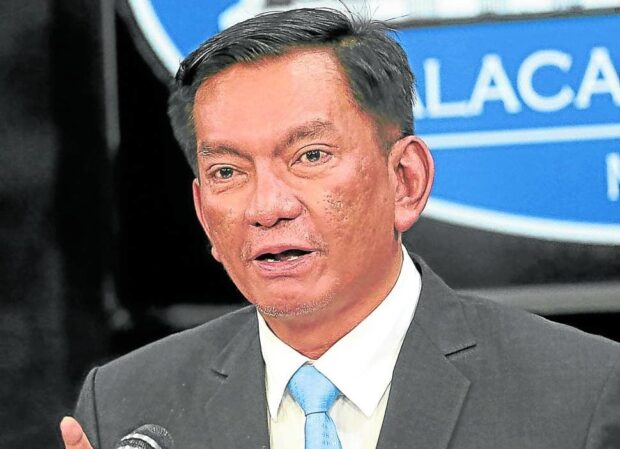
Albay Rep. Joey Salceda (INQUIRER FILE PHOTO)
MANILA, Philippines — Albay 2nd District Rep. Joey Salceda called out on Wednesday the administration’s finance cluster for its slow release of funds for 2023, saying that disbursements were down by 1.05 percent for the first quarter.
Salceda, chairperson of the House Committee on Ways and eans, took the opportunity during Wednesday’s hearing to scold the Department of Budget and Management (DBM), the Department of Finance (DOF), and the Bureau of Treasury (BTr) for not distributing funds quickly, resulting in a “contractionary fiscal policy.”
“Unfortunately, despite growth in collections, we are actually implementing contractionary fiscal policy, with disbursements being 1.05% down, despite expectations of around 6% real GDP growth this year,” he said.
“Together with the Fed’s continued commitment to increase hikes further by at least 25 bps this week, and the contractionary monetary policy that these actions force our BSP to take, we cannot expect resilient growth with these economic policies,” he added.
Salceda, who is an economist, also warned that, if the government would not spend much, the country might miss its growth targets since the Bangko Sentral ng Pilipinas was cutting its rates while the US Federal Reserve continues its hike — forcing the Philippines to rely on private investments.
Similarly, Salceda said that agencies involved in the provision of services — such as the Department of Public Works and Highways (DPWH) and the Department of Labor and Employment (DOLE) — must be more aggressive in implementing their projects.
“The [DBM] already has the authority to release allotment orders from President (Ferdinand) Marcos (Jr.). It must use the authority in consonance with our growth targets. Otherwise, we are not putting our money where our mouths are,” Salceda said.
“And crucial agencies for economic and social services, such as DPWH, DOLE, and DBM, must Be more aggressive in implementing programs to expand productivity. Otherwise, growth will come solely from the private sector – and we are very likely to fall short of our targets. And as one of my mentors, Former Secretary Winnie Monsod once chided me about, when we miss growth targets, the sick die and families go hungry,” he added.
During the hearing, Salceda said that the DBM, DOF, and the BTr had performed poorly compared to other agencies like the Bureau of Internal Revenue (BIR), which is expected to collect P300.9 billion in April, and the Bureau of Customs (BOC), which was expecting P68.274 billion.
The BI collection is 25 percent higher than the P239.6 billion during the same period in 2022, while BOC is seen to exceed its targets by 0.11 percent.
“This suggests that, despite uncertain global conditions, our tax collection agencies are exceeding expectations and are working hard to earn the lifeblood of the Philippine government,” Salceda said.
Last December, President Ferdinand Marcos Jr. signed the first-ever full budget of his term, amounting to P5.268 trillion.
There were high expectations about the first budget of the Marcos administration, especially with funding for the agriculture sector having increased by at least 39 percent.
BIR scolded too
Despite his praise for the BIR, Salceda scolded the agency because its representatives failed to answer his questions during the hearing
The committee was discussing proposals to strengthen and expand the Philippine Science High School (PSHS) system when Salceda asked the BIR’s opinion over taxation provisions in the bill — particularly the tax exemption for donations that are directed to educational purposes, and in the importation of equipment used for scholastic activities.
“What is our procedure here to express the disgust of this committee for the noncooperation of the BIR? Is there a procedure?” Salceda asked his committee secretariat.
“They’ve been uncooperative […] Can we use the prison cell of Congress also for BIR? I think they are being obstructionist to the flow of the intellectual discourse of importance for the life-blood doctrine of this country. They account for 70 percent of the entire revenue base of this government,” he added.
Salceda asked the committee secretariat to write a “very strongly-worded” letter to the BIR about the incident. However, minutes later, Roy Shaun Tancinco of the BIR Law and Legislative Division showed up to apologize as he encountered technical issues.
The lawmaker then asked Tancinco why it seemed that the BIR was evading the House.
“Why are you running away? Have you done anything wrong to us?” Salceda asked in Filipino.
“Apologies, your Honor […] None, Your Honor. Apologies, Your Honor. My signal was cut,” Tancinco replied, speaking in a mix of English and Filpino.
“Maybe you already have a signal. I can give you fault. You guys are irritating,” Salceda fired back.
The situation eventually calmed down after Tancinco noted that BIR did not oppose the exemption of donors from tax dues, as stated under the substitute bill for the strengthening of the PSHS system.
“We already gave you a leeway. We have been giving way to you. We have been considering what you want. And then on this simple question, you cannot answer us? What’s that about?” Salceda said.
“Apologies, Your Honor. I had technical difficulties, Your Honor. With regards to this, I think this question about the tax exemption, Your Honor, about the donor’s taxes. As we manifested, Your Honor, it is already considered already part of the Tax Code, Your Honor. That’s why we don’t interpose any objections to it, Your Honor,” Tancinco said.
—WITH A REPORT FROM MARIA LIEZL PROJELLA (TRAINEE)
RELATED STORIES